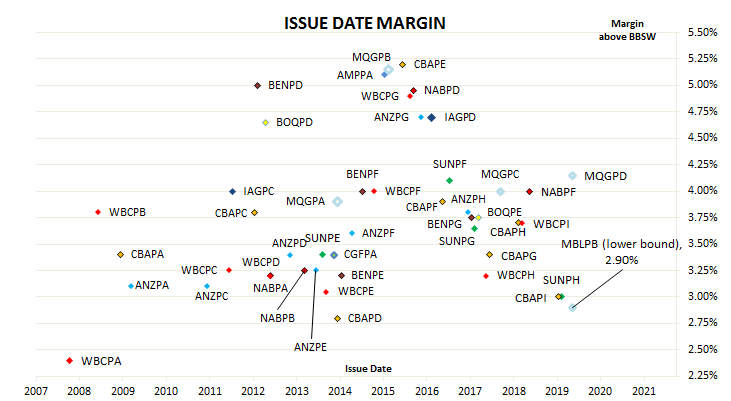Editor’s note: This issue did not go ahead. It was “pulled” by Macquarie on 13 March 2020. An amended issue was re-launched on 11 May 2020.
In recent years, when one of an Australian company’s existing hybrids approaches its first call date (or first optional exchange date), speculation turns to the likelihood of a replacement hybrid security. Macquarie Bank’s latest hybrid security offer fits the bill, as its first series of capital notes is fast approaching its March 2020 call date.
Macquarie Bank plans to raise $400 million via an issue of Capital Notes 2 (ASX code: MBLPB) securities, with the ability to raise more or less than this amount. The new securities will be perpetual, convertible, subordinated, unsecured notes and the proceeds will be used “for general corporate purposes” in addition to funding the resale/redemption of Macquarie Bank’s existing Capital Notes (ASX code: MBLPA).
A stockbroker who did not wish to be named described the deal as “finely priced at best that’s hard to get fired up about.” However, the broker also said the deal would have no problem being put away with investors.
The new notes have some features in common with equities and some features in common with debt securities. Distributions are at the discretion of directors but they are calculated according to a set formula with reference to the $100 face value of the securities. The notes will qualify as Additional Tier 1 (AT1) capital under the Basel III bank regulatory framework, which means they have the now-standard “event” clauses which may lead to early conversion into ordinary shares or a write-off of the capital notes should APRA require it. In the event Macquarie Bank were wound up (and APRA had not already forced a write-off), its hybrids would rank above ordinary shares but below ordinary debt securities and other liabilities.
The new capital notes have an indicative distribution rate equivalent to 3 month BBSW plus a margin of 290bps to 310bps. The final margin will be determined by a “book build” on 14 February 2020. A book build is a tender process managed by investment banks on behalf of the issuer in which investment institutions each place bids for a set volume at a price/yield. (This is the same way as the AOFM holds tenders to sell government bonds each week). If history is any guide, then the margin is likely to be set at the lower end.
Distributions will be non-cumulative, at the discretion of directors and paid quarterly in arrears. However, should a distribution not be paid, Macquarie Bank cannot declare or pay a dividend on its ordinary shares or even buy-back or reduce its ordinary share capital.
At the prevailing level of interest rates and if the margin is at the lower end of the range, the new notes will initially pay around 3.80% (annualised) inclusive of franking credits. *As interest rates change, specifically the bank bill swap rate, quarterly payments will also change.

